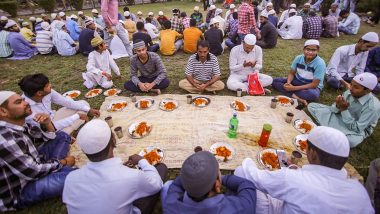Ramzan, also known as, Ramadan which has begun in India from May 7, 2019, and on May 6 in European countries, western countries and the Middle East. Today (May 13, 2019) is the 7th fast (Roza) in most parts of the world and Muslims have already got into this spiritual mode. This month involves 30 days of fasting and will end on June 4, 2019, after which Eid will be celebrated on June 5 or June 6 depending upon the sighting of the moon. In this holy month of Ramzan, we often hear complaints like difficulty in maintaining fitness, digestive health and facing problems like bloating, gas problem and acidity. Let us explore ways by which we can overcome these problems in this Islamic Month of Ramadan. How to Workout During Ramadan 2019: Diet Plan and Easy Exercise to Avoid Muscle Loss As Well Lose Extra Fat.
People who practice Roza have to wake up early in the morning to eat their morning meal which is known as Sehri which ends at around 4:45 am in India. The fasting lasts for more than 14 hours as this time Ramzan has come in summer in most parts of the world where days are longer. Evening time when fast is broken it is known as Iftar which is mostly observed between 7:05 pm to 8:00 pm depending from place to place. One has to stay without food and water for such long duration and the biggest task is to stay hydrated and avoid gas problems. Ramzan 2019 Timetable: Iftar & Sehri Timings in Mumbai, Delhi, Kolkata, Chennai & Other Cities of India.
Easy Ways to Stay Fit During Ramadan
1.Sleep: It is very important to get adequate sleep irrespective of whether you practice fast or not, as your body reacts and grows when you sleep. Our body Resting Metabolic Rate (RMR) function when we sleep. RMR is the rate at which our body burns calories when at rest. Therefore it is necessary to take adequate sleep before waking up for Sehri.
2. Do Light Exercise: Physical movement of the body is necessary for proper digestion and good health. In order to help your body function in a proper manner during Ramzan, one should take out time to do walking or moderate exercise at home like push-ups, bodyweight squats, planks or play badminton or simply go swimming. But make sure that these activities are done when you are allowed to eat and drink i.e any time between Iftar and Sehri. Ideally, it is recommended to do swimming or moderate exercise after breaking fast before Namaz-e-Aisha. If you are planning to do a brisk walk or play badminton then the best time is after you have your last meal before sleeping.

3. Avoid sugary and processed food: In Ramzan, we have very tempting desserts like Rabdi Malpuwa and Faloodas, unfortunately in order to stay fit one should avoid these stuff as they are very high in fat and contain refined carbohydrates such as sugar. Also one should do away from ready to make stuff which comes in a tinned pack as they contain lots of preservatives which is not good for our body.
4. Avoid caffeine: When you are fasting you should forget about drinking coffee and carbonated drinks as it stimulates faster water loss, leading to dehydration.
What to eat and avoid during Ramadan?
Ways to Maintain Your Digestive Health During Ramzan
1. Stay Hydrated: Fluid plays an important role in gut health. If one drink less water it can lead to dehydration which can lead to constipation and bloating. Ideally, it is recommended to drink maximum water between Iftar and Sehri. However, one should not break the fast by drinking water, start Iftar with Dates and fruits. After chewing it properly, one should then take a glass of water. Also, try to include foods like watermelon and cucumber in your Iftar as it contains lots of water.
2. Include Fibre Rich Diet: In Ramzan ideally one can have only three meals i.e. Iftar, Dinner and Sehri in which getting adequate fibre intake becomes a difficult task and it can suffer the gut health. Meals such as Harira and lentil soup contain good amounts of fibre and should be included in your diet during Ramzan.
3. Eat Yoghurt After Iftar: Yogurt is naturally filled with a probiotic that strengthens the digestive tract. One can also try Greek yoghurt as they boast of having added probiotics like Lactobacillus acidophilus and Lactobacillus casei that may help increase the good bacteria in your gut.
4. Drink Coconut Water After Walking: Coconut water serves as a powerful natural sports drink for instant energy. It contains natural enzymes and minerals like potassium that make it an ideal drink during Ramzan. Coconut water is low in calories and easy on the stomach. Ideally one should drink it after a light exercise session or after a brisk walk or after Iftar time as it avoids bloating and replenishes our body with lost electrolytes. Most importantly it will keep your body hydrated during Ramzan.

5. Eat fluid rich and high fibre food for Sehri: Include fluid-rich foods in Sehri to make sure you are well hydrated for the day ahead. Also, incorporate starchy foods in your Sehri meal for energy. Fibre-rich food should be the part of your Suhoor as it will help improve digestion and avoid constipation. Foods like Oats and muesli with milk or yoghurt along with one banana is best for Sehri meal.
The Holy month of Ramzan only comes once in a year, one should spend it in a good way by worshipping Almighty and doing good deeds. Ramadan doesn't mean eating fancy foods and staying wake up till late at night as it will just take a hit on your health. Fasting is observed by all religion sometime or the other, the above guidelines can be observed by other communities too while practising fast.
(The above story first appeared on LatestLY on May 13, 2019 12:20 PM IST. For more news and updates on politics, world, sports, entertainment and lifestyle, log on to our website latestly.com).













 Quickly
Quickly


